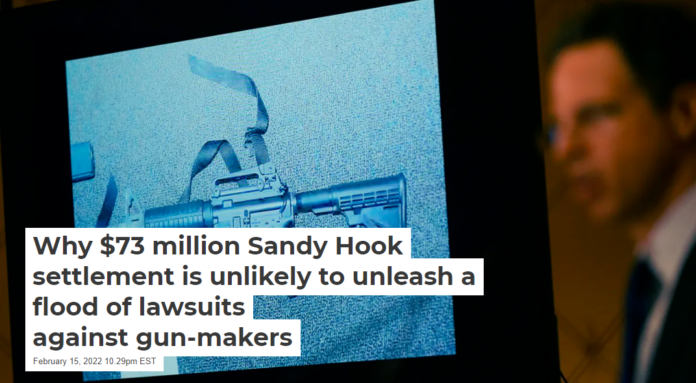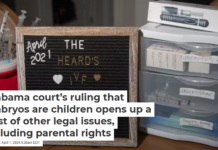

Timothy D. Lytton, Georgia State University
Families of the victims of the 2012 shooting at Sandy Hook Elementary School reached a historic US$73 million settlement with gun-maker Remington Arms. The Feb. 15, 2022, deal marks the first time a firearms manufacturer has settled a lawsuit brought by gun violence victims since Congress granted the industry sweeping immunity from civil liability in 2005.
Since it was filed in 2015 in Connecticut, the Sandy Hook case has focused media attention on claims that the firearms industry bears some responsibility for the epidemic of gun violence in the U.S. As part of the settlement, Remington agreed to release thousands of pages of internal company documents about its marketing strategy for the semiautomatic rifle used in the massacre. The Sandy Hook families hope that these will provide clues as to how manufacturers can reduce the criminal misuse of their weapons.
Prior to the settlement, some media reports suggested the case could unleash a flood of litigation or significantly change the landscape of lawsuits against the gun industry. However, as a legal scholar who has studied the history of lawsuits against the gun industry, I believe that’s unlikely.
To see why, we need to first review the federal liability shield protecting gun-makers at the heart of the case.
An Uncertain Legacy
That law, known as the Protection of Lawful Commerce in Arms Act, grants gun manufacturers immunity from lawsuits that arise out of the criminal misuse of a weapon.
But the Sandy Hook families argued that their lawsuit fell under an exception to this federal immunity. The exception allows gun violence victims to sue a manufacturer who “knowingly violated a state or federal statute applicable to the sale or marketing” of a firearm.
The families claimed that Remington Arms “marketed, advertised and promoted the Bushmaster XM15-E2S for civilians to use to carry out offensive, military style combat missions against their perceived enemies.” They said that this marketing was unethical and therefore violated Connecticut’s Unfair Trade Practices Act, which they argued is a state statute applicable to the marketing of a firearm.
The Connecticut high court agreed and, importantly, interpreted the term “applicable” broadly. That is, the court said that a relevant statute only had to be “capable of being applied” to gun sales, not that the law needed to be specifically about firearms, as other courts had held.
It is this interpretation that could potentially prompt a flood of lawsuits across the country.
Since many states have unfair trade practices laws like Connecticut’s, it seems likely that gun violence victims will bring similar claims elsewhere. Victims are thus likely to allege that a gun manufacturer’s aggressive marketing of combat-style weapons violates a state statute – like an unfair trade practice law – that is applicable to the sale or marketing of a firearm.
However, the U.S. Supreme Court has the last word on the interpretation of federal statutes, and the justices refused in 2019 to hear Remington’s appeal of the case. Presumably, the Supreme Court wanted to wait until the litigation had run its course in the Connecticut state courts before weighing in.
Now that the case has settled, it will never reach the high court – which means the scope of the exception to federal immunity based on a violation of state unfair trade practices law remains unclear.
Regulation through litigation
To many, it seems absurd to hold gun-makers liable for marketing a legal product that did precisely what it was designed to do.
Although the Second Amendment undoubtedly imposes restrictions on the civil liability of gun manufacturers, the idea of holding them liable for carelessness is actually not so far-fetched.
The ultimate goal of litigants in lawsuits against the gun industry is to use civil liability to encourage companies to look for ways to make their products less susceptible to criminal misuse and to prevent the diversion of their products into illegal markets.
This is essentially the tactic being used by states, local governments, tribes and others suing pharmaceutical companies over their role in America’s opioid epidemic. After two decades of litigation, claimants are winning jury verdicts in state courts around the country, and the industry is attempting to negotiate a $26 billion dollar global settlement for federal cases.
But while drugmakers aren’t protected from such lawsuits, gun-makers are – thanks to Congress. That means using civil litigation to regulate the gun industry will require either a repeal of the 2005 law, which seems unlikely, or finding a way around it.
[Over 140,000 readers rely on The Conversation’s newsletters to understand the world. Sign up today.]
The Sandy Hook settlement leaves unanswered the scope of the federal immunity shield, which thwarted all prior attempts to hold gun manufacturers responsible for the criminal misuse of their weapons. What’s more, Remington’s reasons for agreeing to settle may have more to do with the company’s struggle to reemerge from bankruptcy than a newfound willingness among gun-makers to settle claims.
While the settlement is a notable victory for the families of Sandy Hook’s victims, it’s still unclear if it’s a game changer for gun control advocates.
This article incorporates background from articles published on June 21, 2016, and March 25, 2019.
Timothy D. Lytton, Distinguished University Professor & Professor of Law, Georgia State University
This article is republished from The Conversation under a Creative Commons license. Read the original article.



















